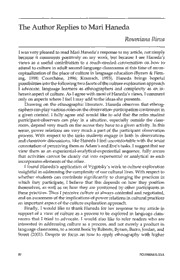
ERIC EJ645368: The Author Replies to Mari Haneda. PDF
Preview ERIC EJ645368: The Author Replies to Mari Haneda.
The Author Replies to Mari Haneda Roumiana Ilieva IwasverypleasedtoreadMariHaneda'sresponse tomyarticle,notsimply because it comments positively on my work, but because I see Haneda's views as a useful contribution to a much-needed conversation on how to attend toculture inadultsecond-languageclassrooms at this timeofrecon ceptualizationoftheplaceofcultureinlanguageeducation(Byram& Flem ing, 1998; Courchene, 1996; Kramsch, 1993). Haneda brings hopeful possibilitiesintothefollowingtwofacetsofthecultureexplorationapproach I advocate: language learners as ethnographers and complexity as an in herentaspectofculture.AsIagreewithmostofHaneda'sviews,Icomment onlyonaspectswhereIfeel Imayaddtotheideasshepresents. Drawing on the ethnographic literature, Haneda observes that ethnog rapherscanplayvariousrolesontheobservation-participationcontinuumin a given context. I fully agree and would like to add that the roles student participant-observers can play in a situation, especially outside the class room, depend very muchontheaccess theyhave to a givenactivity. In this sense, power relations are very much a part of the participant observation process. With respect to the tasks students engage in both in observations and classroom discussions, likeHanedaIfeel uncomfortablewith the sexist connotationofperceivingthemasAdam'sandEve'stasks. Isuggestthatwe view them as an experiential-analytical-experiential sequence, fully aware that activities cannot be clearly cut into experiential or analytical as each incorporateselementsoftheother. I found Haneda's application ofVygotsky's work to culture exploration insightfulinaddressingthecomplexityofourculturallives.Withrespectto whether students can contribute significantly to changing the practices in which they participate, I believe that this depends on how they position themselves, as well as on how they are positioned by other participants in these practices. Thus Iperceive culture as always contested and negotiated, and anawarenessoftheimplicationsofpowerrelationsinculturalpractices animportantaspectofthecultureexplorationapproach. Finally, I would like to thank Haneda for her response to my article in support of a view ofculture as a process to be explored in language class rooms that I tried to advocate. I would also like to refer readers who are interested in addressing culture as a process, and not merely a product in languageclassrooms,toarecentbookbyRoberts,Byram,Barro,Jordan,and Street (2001). Despite its focus on how to apply ethnography with higher 98 ROUMIANAIIIEVA education foreign language students, it presents many ideas that could be pertinentinsecond-languageandcultureinstructioncontexts. References Byram,M.,& Fleming,M.(Eds.).(1998).Languagelearningininterculturalperspective. Cambridge,UK:CambridgeUniversityPress. Courchene,R.(1996).TeachingCanadianculture:Teacherpreparation.TESLCanadaJournal, 13(2),1-16. Kramsch,C.(1993).Contextandcultureinlanguageteaching.Oxford,UK:OxfordUniversity Press. Roberts,c.,Byram,M.,Barra,A.,Jordan,S.,Street,& B.(2001).Languagelearnersas ethnographers.Clevedon,UK:MultilingualMatters. TESLCANADAJOURNAUREVUETESLDUCANADA 99 VOL.19,NO.2,SPRING2002
